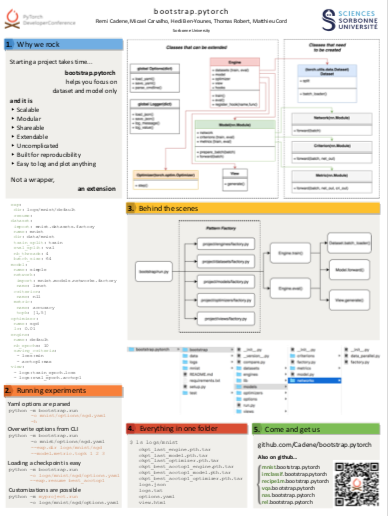bootstrap.pytorch is a high-level extension for deep learning projects with PyTorch.
It aims at accelerating research projects and prototyping by providing a powerful workflow focused on your dataset and model.
And it is:
- Scalable
- Modular
- Shareable
- Extendable
- Uncomplicated
- Built for reproducibility
- Easy to log and plot anything
Unlike many others, bootstrap.pytorch is not a wrapper over pytorch, but a powerful extension.
To run an experiment (training + evaluation):
python -m bootstrap.run
-o myproject/options/sgd.yaml
To display parsed options from the yaml file:
python -m bootstrap.run
-o myproject/options/sgd.yaml
-h
Running an experiment will create 4 files, here is an example with mnist:
- options.yaml contains the options used for the experiment
- logs.txt contains all the information given to the logger
- logs.json contains the following data: train_epoch.loss, train_batch.loss, eval_epoch.accuracy_top1, etc
- view.html contains training and evaluation curves with javascript utilities (plotly)
To save the next experiment in a specific directory:
python -m bootstrap.run
-o myproject/options/sgd.yaml
--exp.dir logs/custom
To reload an experiment:
python -m bootstrap.run
-o logs/custom/options.yaml
--exp.resume last
The package reference is available on the documentation website.
It also contains some notes:
- mnist.bootstrap.pytorch is a useful example for starting a quick project with bootstrap
- vision.bootstrap.pytorch contains utilities to train image classifier, object detector, etc. on usual datasets like imagenet, cifar10, cifar100, coco, visual genome, etc
- recipe1m.bootstrap.pytorch is a project for image-text retrieval related to the Recip1M dataset developped in the context of a SIGIR18 paper
- block.bootstrap.pytorch is a project focused on fusion modules related to the VQA 2.0, TDIUC and VRD datasets developped in the context of a AAAI19 paper
Contributions to this repository are welcome and encouraged. We also have a public trello board with prospect features, as well as an indication of those currently being developed. Feel free to contact us with suggestions, or send a pull request.
bootstrap.pytorch was conceived and is maintained by Rémi Cadène and Micael Carvalho, with helpful discussions and insights from Thomas Robert and Hedi Ben-Younes. We chose to adopt the [very permissive] BSD-3 license, which allows for commercial and private use, making it compatible with both academy and industry standards.

